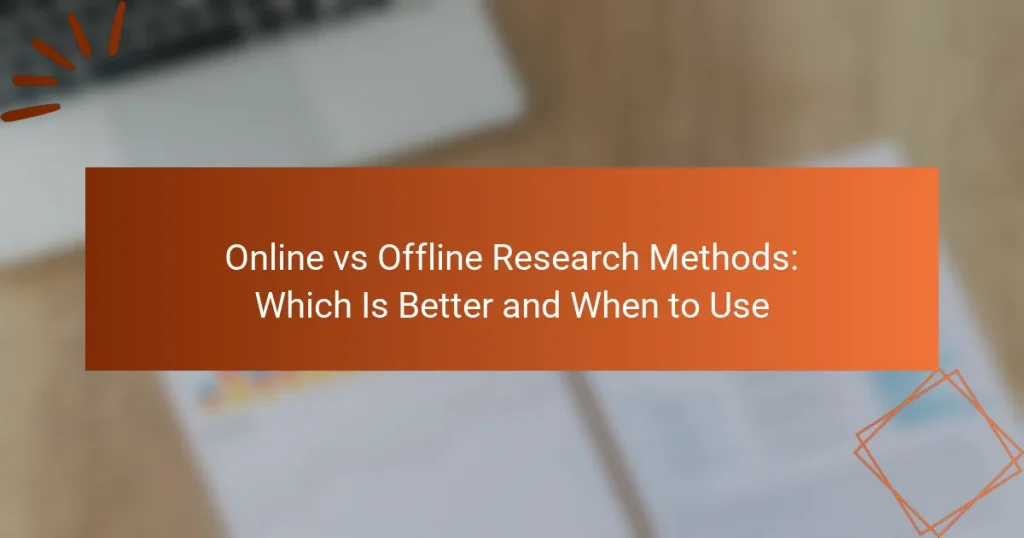Market research services encompass various types designed to meet different business needs and methodologies. By understanding these categories, companies can effectively gather insights about their target audience, industry trends, and competitive landscape, ultimately enabling informed decision-making and strategic enhancements.
Mixed-Methods Research: Impact, Benefits and Decision Making
Observational Research: Role, Benefits and Product Development
Online vs Offline Research Methods: Which Is Better and When to Use
Longitudinal Studies: Importance, Consumer Trends and Tracking
Qualitative vs Quantitative Research: Benefits, Limitations and Applications
Surveys: Effective Strategies, Consumer Insights and Retail Applications
What are the types of market research services available?
Market research services can be categorized into several types, each serving different purposes and methodologies. Understanding these types helps businesses choose the right approach to gather insights about their target market.
Qualitative research services
Qualitative research services focus on understanding consumer behavior and motivations through non-numerical data. Techniques such as interviews, open-ended surveys, and observations are commonly used to gather in-depth insights.
This type of research is particularly useful for exploring new concepts or understanding complex issues. It often involves smaller sample sizes but provides rich, detailed information that can guide product development and marketing strategies.
Quantitative research services
Quantitative research services involve collecting and analyzing numerical data to identify patterns and trends. Surveys with closed-ended questions, experiments, and statistical analysis are typical methods used in this approach.
This type of research is beneficial for measuring market size, demographics, and consumer preferences. It typically requires larger sample sizes to ensure statistical validity, allowing businesses to make data-driven decisions based on solid evidence.
Mixed-methods research services
Mixed-methods research services combine both qualitative and quantitative approaches to provide a comprehensive view of the market. This method leverages the strengths of both types, offering both depth and breadth in data collection.
By integrating numerical data with personal insights, businesses can gain a fuller understanding of consumer behavior. This approach is particularly effective for complex research questions where both statistical analysis and personal narratives are valuable.
Online survey services
Online survey services facilitate the collection of data through digital questionnaires, making it easy to reach a broad audience quickly. These surveys can be distributed via email, social media, or websites, allowing for convenient participation.
They are cost-effective and can yield results in a short timeframe. However, it is crucial to design surveys carefully to avoid bias and ensure clarity in questions, which can impact the quality of the data collected.
Focus group services
Focus group services involve guided discussions with a small group of participants to explore their perceptions and opinions about a product or service. A moderator leads the session, encouraging interaction and deeper insights among participants.
This method is valuable for gathering qualitative data and understanding consumer attitudes in a social context. However, it is essential to select a diverse group of participants to avoid groupthink and ensure a range of perspectives are represented.
How can businesses benefit from market research services?
Businesses can gain valuable insights through market research services, which help them understand their target audience, industry trends, and competitive landscape. By leveraging these insights, companies can make informed decisions that enhance their strategies and operations.
Informed decision-making
Market research services provide data that supports informed decision-making. By analyzing consumer preferences and market trends, businesses can identify opportunities and risks, allowing them to allocate resources effectively. For instance, a company may discover a growing demand for eco-friendly products, prompting them to adjust their product line accordingly.
To make the most of market research, businesses should prioritize data accuracy and relevance. Engaging with reputable research firms can ensure that the insights gathered are based on solid methodologies and current market conditions.
Identifying customer needs
Understanding customer needs is crucial for any business aiming to succeed. Market research services help identify what customers value, their pain points, and their purchasing behaviors. Surveys and focus groups can reveal preferences that guide product development and marketing strategies.
For effective identification of customer needs, businesses should regularly conduct research and adapt to changing consumer expectations. This ongoing process can lead to higher customer satisfaction and loyalty, ultimately driving sales growth.
Competitive analysis
Competitive analysis through market research services enables businesses to understand their rivals’ strengths and weaknesses. By evaluating competitors’ offerings, pricing strategies, and market positioning, companies can identify gaps in the market and differentiate themselves effectively.
To conduct a thorough competitive analysis, businesses should gather data on key competitors and analyze their market share, customer feedback, and marketing tactics. This information can inform strategic decisions, helping businesses to enhance their competitive edge and respond proactively to market changes.
What are the costs associated with market research services?
The costs of market research services can vary widely based on the type of research conducted, the scope of the project, and the provider’s expertise. Generally, businesses should expect to invest anywhere from a few hundred to several thousand dollars, depending on their specific needs and objectives.
Cost of qualitative research
Qualitative research typically involves methods such as focus groups, in-depth interviews, and ethnographic studies. Costs for these services can range from around $1,000 to $10,000 or more, depending on factors like the number of participants and the complexity of the study. For example, a single focus group may cost between $2,000 and $5,000.
When budgeting for qualitative research, consider additional expenses such as venue rental, participant incentives, and transcription services. These can significantly impact the overall cost.
Cost of quantitative research
Quantitative research often includes surveys, experiments, and statistical analysis, with costs generally ranging from $5,000 to $50,000 or higher. Online surveys can be more affordable, sometimes starting at a few hundred dollars, while comprehensive studies involving large sample sizes and detailed analysis will be on the higher end.
It’s essential to factor in costs for data collection tools, software licenses, and analysis services when planning a quantitative research budget. These elements can add up quickly, so a clear scope is vital.
Factors influencing pricing
Several factors can influence the pricing of market research services, including the research method chosen, the target audience, and the geographical scope. For instance, studies targeting niche markets or requiring specialized expertise may incur higher costs.
Additionally, the timeline for the research can affect pricing. Rush projects often come with premium fees, while longer timelines may allow for more cost-effective solutions. Always clarify the scope and timeline with your provider to avoid unexpected costs.
How to choose the right market research service?
Choosing the right market research service involves understanding your specific needs and evaluating potential providers based on their capabilities. Focus on defining your research objectives, assessing service providers, and considering your budget constraints to make an informed decision.
Define research objectives
Clearly defining your research objectives is the first step in selecting a market research service. Identify what information you need, such as customer preferences, market trends, or competitive analysis. This clarity will guide you in choosing a service that aligns with your goals.
Consider whether you need qualitative insights, such as focus groups, or quantitative data, like surveys. Each type of research serves different purposes, so understanding your objectives will help narrow down your options effectively.
Evaluate service providers
When evaluating market research service providers, look for their experience and expertise in your industry. Check their track record by reviewing case studies and client testimonials to gauge their effectiveness. A provider with a strong portfolio in similar projects can offer valuable insights.
Additionally, assess their methodologies and tools. Ensure they use up-to-date techniques and technologies that can deliver accurate and actionable results. Don’t hesitate to ask for a proposal that outlines their approach to your specific research needs.
Consider budget constraints
Budget constraints play a crucial role in selecting a market research service. Determine how much you can allocate for research and communicate this to potential providers. This will help them tailor their offerings to fit your financial parameters.
Keep in mind that market research costs can vary significantly based on the complexity of the project and the methods used. Simple surveys may range from a few hundred to a few thousand dollars, while comprehensive studies can cost tens of thousands. Balancing quality and cost is essential for effective decision-making.
What are the leading market research firms in the US?
The leading market research firms in the US include companies like Nielsen, Ipsos, and Kantar. These firms specialize in providing insights through various methodologies, including surveys, focus groups, and data analysis, helping businesses understand consumer behavior and market trends.
Nielsen
Nielsen is renowned for its television ratings and consumer insights. It employs a combination of surveys and data analytics to track viewer habits and preferences, making it a go-to for media companies and advertisers. Businesses can leverage Nielsen’s extensive databases to tailor their marketing strategies effectively.
Ipsos
Ipsos is a global market research firm that focuses on understanding public opinion and consumer behavior. They utilize qualitative and quantitative research methods to provide insights across various sectors, including healthcare, technology, and retail. Their expertise helps companies make informed decisions based on consumer feedback and market dynamics.
Kantar
Kantar specializes in brand strategy and consumer insights, offering a wide range of research services. They analyze market trends and consumer preferences to help brands optimize their marketing efforts. Kantar’s data-driven approach enables businesses to identify growth opportunities and enhance customer engagement.





